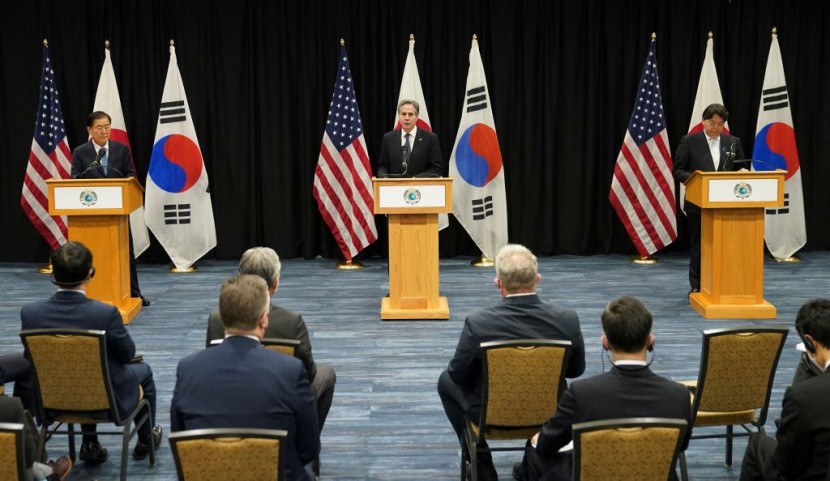
On Saturday, US Secretary of State Antony Blinken met with his Japanese and South Korean counterparts in Hawaii to discuss the threat posed by a nuclear-armed North Korea, which began the year with a series of missile launches.
North Korea was "in a phase of provocation," Blinken said at a press briefing following the talks, and the three countries denounced the latest missile tests.
US, Japan, South Korea Commit to Aligning Approach North Korea
The nations were "very closely conferring" on future actions they may take in response to North Korea after Blinken's discussions with Japanese Foreign Minister Yoshimasa Hayashi and South Korean Foreign Minister Chung Eui-yong, but they didn't go into detail.
They issued a joint statement in which they urged North Korea to engage in discussion and stop its "unlawful acts." They also stated that they had no ill-will toward North Korea and were willing to meet with it without any preconditions. The three ministers held a "very good" conversation on the North, Hayashi subsequently told Japanese media. He was hesitant to go into detail about any extra precautions they might take.
North Korea has a lengthy history of seeking international concessions through provocations such as a missile or nuclear tests. In addition to decades of mismanagement and devastating US-led sanctions, the North's economy is being severely harmed by widespread border restrictions, according to NBC News.
To get international concessions, North Korea has used provocations such as a missile or nuclear tests for a long time. With the North's economy already devastated by decades of mismanagement and harsh US-led sanctions, the latest tests come as a result of a pandemic of border closures.
Many people believe the tests are a tactic to persuade President Joe Biden's administration to relax the sanctions. Without significant limitations to the North's nuclear program, the Biden administration has shown little readiness to do so, but it has promised open-ended negotiations.
North Korea has rejected US efforts to resume diplomatic negotiations, stating it will not return to discussions unless Washington changes its policies, which it claims are hostile. Both the sanctions and the US's regular military drills with South Korea have riled the North.
The tests have a technological component as well, helping North Korea to improve its stockpile of weapons. The Hwasong-12 intermediate-range ballistic missile, which was recently tested, is capable of hitting the US island of Guam. Since 2017, it had become the North's longest-distance weapon, as per Hindustan Times.
Read Also : Vladimir Putin, Russia Invasion of Ukraine Could Start During Olympics; Americans Get Warning To Leave Now
South's Moon Jae-in Says Dialogue Can Solve North Korea Issues
The peace process between South Korean President Moon Jae-in and the North Korean Peninsula's denuclearization have de facto come to an end with no tangible outcomes. Moon's successor will be elected in March, and Moon's tenure will finish in May so any breakthroughs before then seemed improbable.
The only way to handle North Korea's difficulties, Moon said in a recent interview, is via discussion, and he hoped that his successor would continue his peace process to ensure that the Korean Peninsula remained peaceful and prosperous for the foreseeable future.
Lee Jae-myung, the leader of the Democratic Party, and Yoon Suk-yeol, the leader of the People Power Party, are locked in a close contest for the presidency. In general, Yoon is slightly ahead of Lee in surveys although the gap is still within the margin of error.
If Lee wins the election, his administration will carry on Moon's North Korean peace initiative. Yoon's criticism of Moon's approach to North Korea and the need to deploy an additional battery of the anti-missile defense system Terminal High Altitude Area Defense (THAAD) on South Korean soil to deter North Korea's missile threats will change Seoul's approach to North Korea significantly if he wins the election.
Because of the low height of the missiles, South Korea would be unable to intercept North Korea's short-range missiles flying toward its country with THAAD. In order to get support from conservatives, Yoon has dug in his heels on North Korea matters, choosing a defense-oriented strategy, according to The Diplomat.
Related Article : Blinken Discusses With Japan, South Korean Officials About Possible Actions on North Korea's Missile Tests
@YouTube
© 2025 HNGN, All rights reserved. Do not reproduce without permission.








